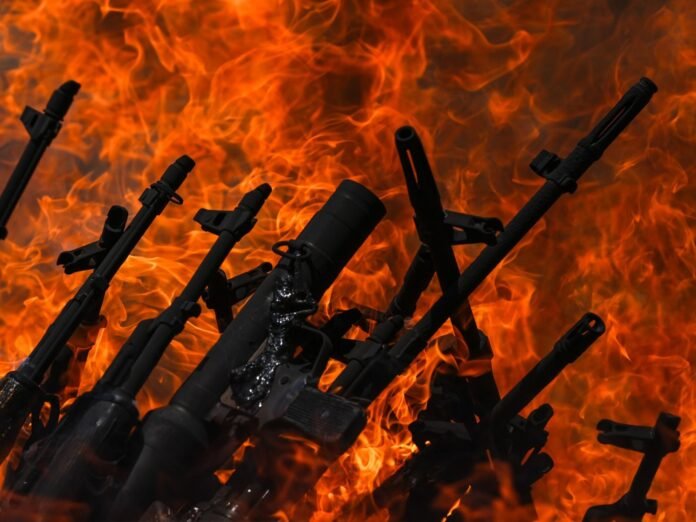The PKK began its first phase of disarmament last week, analysts say the process will be felt regionally.
On Friday, 30 fighters from the Kurdistan Workers’ Party (PKK) threw their weapons into a bonfire at a meeting in Sulaimaniyah, a city in the autonomous Kurdish region of northern Iraq.
After hiding out in Iraq’s Qandil Mountains for three decades, where they reportedly trained for combat and planned attacks against Turkiye, they were now renouncing their armed struggle.
The symbolic gesture is the first phase of disarming the PKK as part of a rejuvenated peace process with Turkiye, which could end a 40-year conflict that has killed some 40,000 people.
As the process unfolds, a question arises about how this may affect the broader region, including the autonomous Kurdish areas in Iraq and Syria.
In February, jailed PKK leader Abdulla Ocalan called on his fighters to fully disarm, saying the time for armed struggle was over and Kurds could now realise their rights through politics.
Senior PKK leaders heeded the call in April and agreed to a new peace process with Turkiye.
They believe the government is wary of disclosing details to avoid public backlash from some nationalist quarters, who may see any concessions as rewarding the PKK for armed rebellion.
The process will likely entail a general amnesty for PKK fighters and giving Kurds the political and cultural rights they have long demanded, which would allow disarmed PKK fighters to return to Turkiye from northern Iraq, Sinan Ulgen, an expert on Turkiye and a senior fellow at the Carnegie Endowment for Peace, said.
Only senior leaders would continue to live abroad, without fear of being targeted.
However, he added, there has been no public discussion of how the government plans to reintegrate former PKK fighters into civilian life.
“The lack of transparency raises the question over how much public support there is for this initiative,” Ulgen told media.
Lack of transparency
According to Tol, Kurdish politicians are expecting Erdogan to make some political concessions to the Kurds through the recently established Turkish Parliamentary Committee.
Failure to do so, she warns, could collapse the peace process.
This dynamic continued after the US invasion of Iraq in 2003, which officially brought about an autonomous Kurdish region in the north.
Turkiye has on many occasions bombarded PKK positions in the mountains, often relying on jets, artillery and helicopters.
The Kurdistan Regional Government (KRG), which governs the Kurdish autonomous region, has never interfered in the fighting, noted Nazli al-Tarzani, an independent Iraqi analyst.
However, she said Iraq’s Kurdish parties, the Patriotic Union of Kurdistan (PUK) and the Kurdistan Democratic Party (KDP), may now try to exploit the peace process if it succeeds.
They could exaggerate their role in the process to attract voters in the upcoming national elections in November, she added.
“Things always heat up during an election cycle, and they could use the [disarmament] as a point-scoring exercise,” al-Tarzani told media.
The other scenario, said al-Tarzani, would see a resumption of conflict between Turkiye and the PKK in the Qandil Mountains.
She added that the KRG has strong commercial and economic ties with Turkiye and will likely remain quiet and in the peripheries if the peace process collapses and conflict resumes.
On top of that, she explained, the KRG cannot assist Turkiye with such a complicated military operation.

